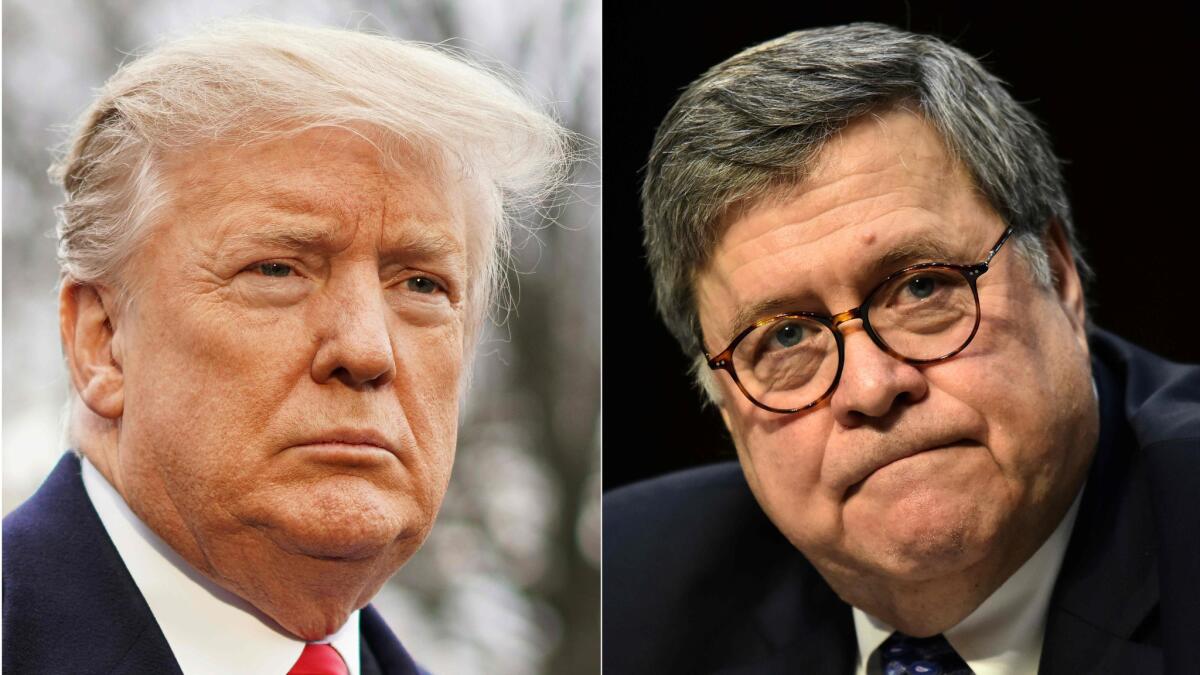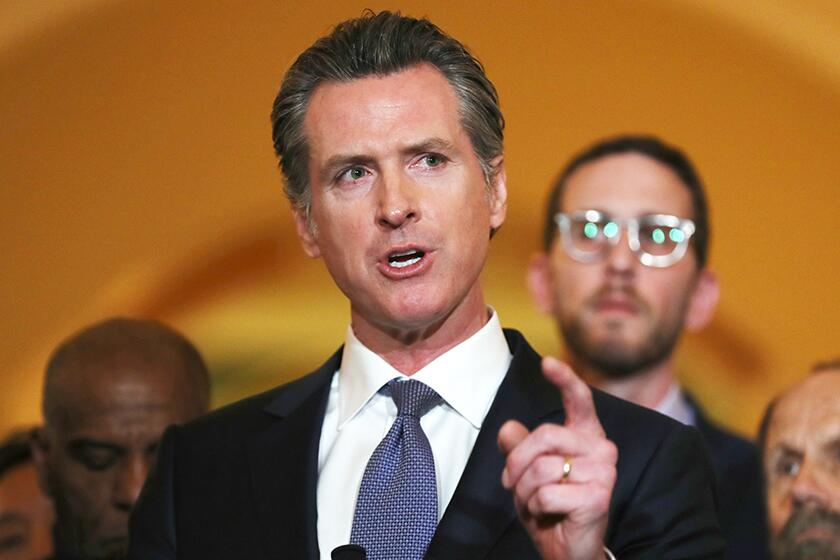Disregarding Barr, Trump claims ‘legal right’ to intervene in criminal cases

- Share via
WASHINGTON — President Trump on Friday ignored his attorney general’s public request to stop tweeting about the Justice Department, saying he had the legal right to ask the agency to intervene in a criminal case, but he’s so far “chosen not to.”
Trump’s Friday morning tweet came just hours after Atty. Gen. William Barr said in a striking interview with ABC News that the president’s tweets were making it “impossible” to do his job, especially following the department’s bungled handling of the sentencing recommendation for Trump ally and confidant Roger Stone.
Trump, in his tweet, also left open the possibility that he would ask Barr for something in a criminal matter in the future.
As president, Trump technically has the right to compel the Justice Department — an executive branch agency — to investigate. But historically, when it comes to decisions on criminal investigations and prosecutions, the Justice Department has functioned independently, unmoved and unbound by political sway. In the ABC interview, Barr said the department’s reputation for independence was important.
“I’m happy to say that, in fact, the president has never asked me to do anything in a criminal case,” Barr said. “However, to have public statements and tweets made about the department, about our people ... about cases pending in the department, and about judges before whom we have cases, make it impossible for me to do my job and to assure the courts and the prosecutors in the department that we’re doing our work with integrity.”
The attorney general had repeatedly shared the same sentiment in private conversations with the president in recent weeks, telling Trump he was frustrated with the president’s public comments and tweets about Justice Department cases, a person familiar with the matter told the Associated Press. The person spoke on condition of anonymity in order to discuss the private conversations.
Barr was directly asked whether he believed Trump had the authority to direct him to open an investigation.
“Terrorism or fraud by a bank or something like that where he’s concerned about something, he can certainly say I think someone should look into that. That’s perfectly appropriate,” Barr said. ”If he were to say, you know, go investigate somebody because — and you sense it’s because they’re a political opponent, then an attorney general shouldn’t carry that out, wouldn’t carry that out.”
Trump has publicly and privately raged about payback in the form of investigations against his perceived enemies, including former FBI directors James B. Comey and Andrew McCabe, and he’s also pressed for investigations into political rival Joe Biden and his son Hunter, especially following Trump’s impeachment acquittal over a phone call where he asked Ukraine’s leaders to investigate the Bidens.
Attorney General William Barr said President Donald Trump’s tweets and public comments about the Justice Department and ongoing cases make his job “impossible.”
An administration official acknowledged there had been some tension between Trump and Barr in recent weeks, but Trump still has confidence in Barr and believes he is a far better attorney general than Jeff Sessions, who drew Trump’s ire after recusing himself from the investigation into Russian interference in the 2016 election because of his previous work with the Trump campaign.
The official, who spoke on condition of anonymity in order to discuss internal deliberations and private conversations, said Trump also knows it would be risky to remove Barr ahead of the 2020 election and that it is highly unlikely he could find a replacement for Barr before then.
Officials in the attorney general’s office gave the White House a readout of the interview after it was taped but before it aired on ABC’s website, the person familiar with the matter said. After the interview Thursday evening, the White House offered a tempered response, saying Trump “wasn’t bothered by the comments at all and he [Barr] has the right, just like any American citizen, to publicly offer his opinions.”
But the president on Friday quoted one of Barr’s comments in the interview — “The President has never asked me to do anything in a criminal case” and then added in his tweet — “This doesn’t mean that I do not have, as President, the legal right to do so, I do, but I have so far chosen not to!”
Earlier this week, the Justice Department overruled its own prosecutors — who had recommended in a court filing that Trump’s longtime ally and confidant Roger Stone be sentenced to seven to nine years in prison — and took the extraordinary step of lowering the amount of prison time it would seek. The department didn’t offer an amended number. In response to the amended filing, the government’s entire trial team quit the case and one quit the DOJ altogether.
And Barr faced intense criticism over the decision because it came just hours after Trump tweeted his displeasure about the recommendation.
Stone was convicted in November of tampering with a witness and obstructing the House investigation into whether the Trump campaign coordinated with Russia to tip the 2016 election. He’s scheduled to be sentenced next week.
Barr himself has been under fire for the reversal. Still, it was a highly unusual move for a member of the Cabinet to publicly criticize the president — especially a Trump loyalist who shares the president’s views on expansive executive powers. Thursday’s comments served as an attempt to defend his own integrity and reputation and that of the Department of Justice by publicly rebuking the president he has propped up from Day 1 of his tenure.
Those Barr’s remarks suggested he was aware the department’s reputation had suffered, he stopped short of acknowledging wrongdoing by anyone.
House Democrats frustrated over the Senate’s acquittal of Trump want to ask Barr about what they see as the politicization of federal law enforcement. House Judiciary Committee Chairman Jerrold Nadler (D-N.Y.) said earlier this week that Barr would testify before the panel March 31.
Barr said Trump’s tweets created perception problems for the department, but he denied there was any order from Trump and said Trump’s tweets did not factor into the decision on Stone’s sentencing recommendation.
The department insisted the decision was made Monday night — before Trump blasted the recommendation on Twitter as “very horrible and unfair”— and prosecutors had not spoken to the White House about it.
Barr joined a roster of high-level aides who have publicly criticized Trump, though the rest left the job first. Former national security advisor John Bolton is to publish a book next month detailing his time in the White House. And former Chief of Staff John F. Kelly, who has largely kept a low profile since leaving the White House, has grown more open about his unflattering assessments of the president.
More to Read
Get the L.A. Times Politics newsletter
Deeply reported insights into legislation, politics and policy from Sacramento, Washington and beyond. In your inbox twice per week.
You may occasionally receive promotional content from the Los Angeles Times.









